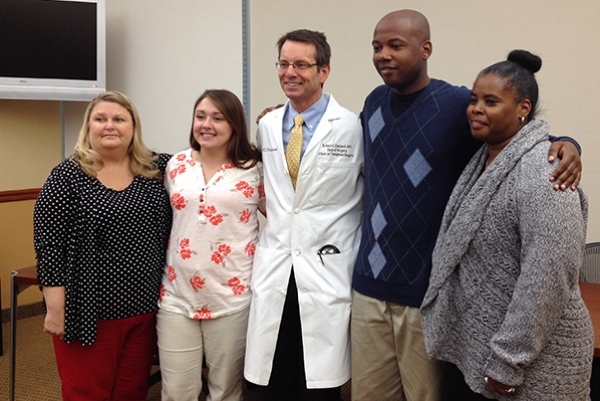Publisher's note: The authors of this post, Beth Anne Atkins, Vidant Health Corporate Communications, and Jeannine Manning Hutson are contributors to ECU News Services.
ECU, Vidant Medical Center provide gift of life via four-person kidney exchange
Surgeons with the Brody School of Medicine and Vidant Medical Center teamed to perform a four-person kidney exchange Dec. 16 at the hospital. Two weeks later, the patients and their families met for the first time.
"It's a win-win," said Dr. Robert Harland, professor and chief of surgical immunology and transplantation at ECU and chief of transplant surgery at Vidant Medical Center. He spoke to members of the media about the surgeries Dec. 30.
"We're constantly trying to figure out ways to get people successfully transplanted. A living donor is a win-win situation, freeing up two kidneys from the living donor pool to go somewhere else and connecting two people who otherwise might never have been connected," he said.
Dr. Claire Morgan, ECU transplant surgeon and head of Vidantís living donor program, sits beside kidney transplant recipient Sherrie Hoopes at the Dec. 30 press event following the four-person kidney exchange transplant. (Photos by Jeannine Manning Hutson)
Earlier that day, the donors and recipients met each other for the first time during their follow-up appointments with Harland and Dr. Claire Morgan, a fellow ECU transplant surgeon who heads Vidant's living donor program.
Jamaal Peele of Greenville donated to Sherrie Hoopes of Jacksonville. And Leslie Smith of Bevinsville, Ky., ≠ - a niece of Hoopes - donated to Brenda Peele of Greenville, who is the mother of Jamaal Peele.
Harland said the procedures were successful and allowed two of the hospital's wait list patients to receive living donor kidneys instead of potentially waiting years for a kidney from a deceased donor.
"This is the culmination of a process that has taken several months," Harland said. "Each of these recipients had a willing donor who was not compatible with them.
By finding better matches from our list of incompatible donors, we were able to successfully perform two living donor transplants, which can be performed electively and have a longer lifespan than a transplant from a deceased donor."
Morgan said even though she and Harland were at the press event, they were only representatives of the team who worked to make the transplants successful.
"We are the tip of the iceberg," she said. "We would have never been able to make to do this without the team and just as important are their families. That's huge (to have family support) and it makes it possible."
Other members of the medical team involved in the procedure include the following:
- Dr. Carl Haisch, ECU Physicians
- Dr. Reginald Obi, ECU Physicians
- Dr. Heather Jones, Eastern Nephrology Associates
- Dr. Kristel McLawhorn, Eastern Nephrology Associates
- Dr. Scott Kendrick, Eastern Nephrology Associates
- Dr. Lorita Rebellato, ECU associate professor of pathology and laboratory medicine director of histocompatibility lab
- Karen Chamberlain, RN, donor-transplant coordinator
- Barbara Lee, social worker for donors in transplants and living donor advocate.
In these transplants, the two recipients had antibodies that reacted poorly with their family member's donor tissue types, predicting a much higher risk of rejection. However, by exchanging kidneys, recipients could avoid these incompatibilities and receive a kidney transplant with a more successful outcome.
Both donors underwent their procedures laparoscopically, which allowed the donation to occur with smaller incisions. The donors were discharged from the hospital in two days and typically experience a quicker recovery than traditional kidney donation surgery.
The recipients are off dialysis and have normal kidney function, according to Harland. They were discharged at three and four days after surgery - the usual length of stay.
Before her transplant, Brenda Peele said she was tired all the time. "When I woke up (after the surgery), I felt better than I had in years."
Morgan said receiving a healthy kidney saved Brenda Peele and Sherrie Hoopes the general exhaustion and sickness that can come from years of dialysis. "All this is to get you back to being you," Morgan said.
This is the second kidney exchange performed by the transplant program at Vidant Medical Center, following a six-person exchange performed in 2011. Harland estimates that about 500 paired exchange kidney transplants were performed in the United States in 2013, representing less than 10 percent of the approximately 6,000 living donor kidney transplants performed. However, there has been a rapid growth in this transplant option over the past five years. The first paired kidney exchanges were performed in the U.S. in 2000.
In addition to maintaining an internal paired exchange list, patients listed at Vidant Medical Center can be on a nationwide exchange list, further increasing the option for patients with an incompatible donor who are awaiting kidney transplantation.
Vidant and ECU performed about 100 kidney transplants in 2013. Harland expects more exchange transplants in the future because of that national registry.
Brenda Peele summed up the feelings of the family members attending the press event when she said, "It's just amazing. They matched us and we don't even live in the same state."

Dr. Robert Harland of the Brody School of Medicine, center, posted with participants in the kidney donor exchange, left to right, Sherrie Hoopes of Jacksonville, Leslie Smith of Bevinsville, Ky., Jamaal Peele and his mother, Brenda Peele, both of Greenville, during a press event Dec. 30 at Vidant Medical Center.
























